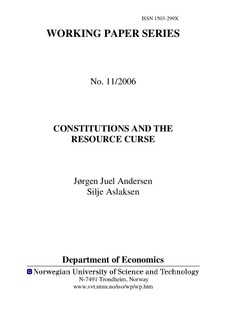| dc.contributor.author | Andersen, Jørgen Juel | nb_NO |
| dc.contributor.author | Aslaksen, Silja | nb_NO |
| dc.date.accessioned | 2014-12-19T14:31:41Z | |
| dc.date.available | 2014-12-19T14:31:41Z | |
| dc.date.created | 2006-09-29 | nb_NO |
| dc.date.issued | 2006 | nb_NO |
| dc.identifier | 126035 | nb_NO |
| dc.identifier.uri | http://hdl.handle.net/11250/267057 | |
| dc.description.abstract | Recent advances in the political economy literature suggests that constitutional arrangements determine a wide range of economic pol icy outcomes. In particular, it is argued that different forms of government (presidential versus parliamentary) induce more or less 'growth promoting' policies. However, effects on long run growth have proved harder to identify. We exploit the fact that natural resources are randomly distributed to identify differences in the long-term performance of economies with different constitutional forms. Existing theory suggests that the presence of vast natural resources should affect growth differently in countries with different constitutional designs. Empirically we find strong support for this hypothesis - constitutions indeed seem to matter for how natural resource abundance affects long run growth. In fact, the form of government matters more than democratic rule. We also find interaction effects of electoral rules (majority versus proportional voting) and resource abundance on growth, although these effects are less clear-cut and less robust. | nb_NO |
| dc.language | eng | nb_NO |
| dc.publisher | Institutt for samfunnsøkonomi | nb_NO |
| dc.relation.ispartofseries | Working Paper Series, 1503-299X; 2006:11 | nb_NO |
| dc.title | Constitutions and the resource curse | nb_NO |
| dc.type | Research report | nb_NO |
| dc.contributor.department | Norges teknisk-naturvitenskapelige universitet, Fakultet for samfunnsvitenskap og teknologiledelse, Institutt for samfunnsøkonomi | nb_NO |
